|
|
|
Sort Order |
|
|
|
Items / Page
|
|
|
|
|
|
|
| Srl | Item |
| 1 |
ID:
151495
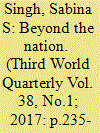

|
|
|
|
|
| Summary/Abstract |
Global frameworks for democratic development today tend to remain within a comparative lens where each country is treated as a sovereign capsule. This portrait eludes the political structures that accompany contemporary globalisation and set the conditions for domestic development. Notably, the comparative perspective eschews the hierarchical nature of states and influential non-state actors that impact democracy movements. Merging international relations theory and comparative politics and using the example of Uganda to illustrate, I create ‘the politics of dispensation.’ Like a doctor dispensing a pill to a patient, Uganda shows how susceptible a country can be to forces beyond democratic control.
|
|
|
|
|
|
|
|
|
|
|
|
|
|
|
|
| 2 |
ID:
151491
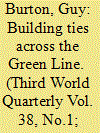

|
|
|
|
|
| Summary/Abstract |
In 2011 Palestinian youth joined together across the Green Line, demonstrating grassroots solidarity and a challenge to the elite consensus in favour of the two-state Oslo process. The movement drew inspiration from the concurrent Arab Spring and the Boycott, Divestment and Sanctions movement, organising joint demonstrations in Israel and the occupied Palestinian territory. However, the movement struggled to develop as a result of challenges regarding its objectives, strategy and representation, and of external threats from Israel and Palestinian political elites.
|
|
|
|
|
|
|
|
|
|
|
|
|
|
|
|
| 3 |
ID:
146653


|
|
|
|
|
| Summary/Abstract |
This article looks at the promise of technology to revolutionise humanitarian action, especially in terms of the gathering and use of data. With many heralding a ‘data revolution’, the opportunities and enthusiasm for using social media and SMS data in crisis response are on the rise. The article constructs an analytical framework in order to scrutinise the three main claims made on behalf of technologically advanced humanitarian information systems: that they can access data more accurately, more quickly, and alter power relations in emancipatory ways. It does so in relation to two aspects of digital humanitarianism: visual technology and crisis mapping, and big data. The article is partly informed by a historical perspective, but also by interview and other material that suggests some of the claims made on behalf of technology are exaggerated. In particular, we argue that the enthusiasm for the data is vastly outstripped by the capacity to meaningfully analyse it. We conclude by scoping the implications of the future technological evolution of humanitarianism, in particular by examining how technology contributes to what Duffield terms ‘post-modern humanitarianism’.
|
|
|
|
|
|
|
|
|
|
|
|
|
|
|
|
| 4 |
ID:
167693
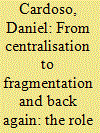

|
|
|
|
|
| Summary/Abstract |
Since the 1990s, Brazil’s foreign policy-making, traditionally a highly centralised and hierarchical process, has become more fragmented, plural and horizontal. In this context, the role of non-state actors has been increasingly relevant. The impact and significance of these actors have been however a matter of debate. While there are authors that consider that non-state actors play only a secondary role in the policy-making process, there are others that assert that these actors work alongside governmental actors and directly influence policy choices. Drawing on the concept of network governance, the paper proposes a different view from the two recurrent approaches in the literature mentioned above. It argues that the recent steps to transform Brazil’s state governance from hierarchy to horizontal networks have indeed expanded the room for the direct participation of non-state actors in the policy process. However, state authorities fought to adjust this tendency, in order to retain control over the decision-making process, by putting in place formal and informal coordinating mechanisms led by the Ministry of Foreign Relations and the Presidency. This suggests Brazil’s foreign policy was made in the shadow of hierarchy. The paper demonstrates the argument using the case of Brazil’s foreign policy towards China.
|
|
|
|
|
|
|
|
|
|
|
|
|
|
|
|
| 5 |
ID:
149441
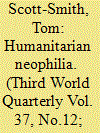

|
|
|
|
|
| Summary/Abstract |
This paper critically examines the ‘humanitarian innovation’ movement, arguing that it represents a departure from classical principles and the entry of a distinctive new ideology into the sector. Labelling this ‘humanitarian neophilia’, the paper argues that it has resonances of Barbrook and Cameron’s ‘Californian Ideology’, with its merging of New Left and New Right within the environs of Silicon Valley. Humanitarian neophilia, similarly, comes from a diverse ideological heritage, combining an optimistic faith in the possibilities of technology with a commitment to the power of markets. It both ‘understates the state’ and ‘overstates the object’, promoting a vision of self-reliant subjects rather than strong nation-states realising substantive socioeconomic rights.
|
|
|
|
|
|
|
|
|
|
|
|
|
|
|
|
| 6 |
ID:
152779
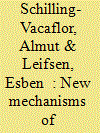

|
|
|
|
|
| Summary/Abstract |
In this special issue, the focus is on the dynamics and use of participatory mechanisms related to the rapid expansion of the extractive industries worldwide and the ways it increasingly affects sensitive natural environments populated by indigenous and other marginalised populations. We offer an empirically grounded and theoretically innovative comparative analysis of practices that aim to enhance participation, negotiation and influence as a response to the expansion of extractive industries. On the one hand, we question the assumption often presented in scholarly debates that participatory processes will contribute to making environmental governance not only more legitimate and effective, but will also lead to the empowerment of marginalised social groups. On the other, we draw on our empirical studies and insights to indicate ways local groups and their allies try to gain ownership and influence decision-making through a range of related participatory mechanisms, ranging from state-led or corporation-led processes like prior consultation and FPIC, compensation practices, participatory planning exercises and the participation in environmental impact assessments (EIAs) to community-led consultations, or community-based or controlled FPIC and impact assessment processes and struggles for community-based governance of natural resource uses.
|
|
|
|
|
|
|
|
|
|
|
|
|
|
|
|
| 7 |
ID:
165072
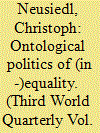

|
|
|
|
|
| Summary/Abstract |
This article aims to add a new line of research to the post-development school of thought. Drawing on the many evident yet rarely noticed parallels between post-development and (post-)anarchism, I develop an understanding of ‘anarchistic post-development’ as a politics based on what French philosopher Jacques Rancière calls ‘the presupposition of equality’. I further connect this with Arturo Escobar and Marisol De la Cadena’s concept of political ontology, suggesting that we can make sense of and analyse both contemporary ‘Development’ projects as well as anarchistic post-developmental ‘alternatives to Development’ through the lens of what I call ‘the ontological politics of (in-)equality’. To substantiate my points, I will draw on the recent case of a Mâori tribe who won a historical legal battle to declare the Whanganui River a living entity.
|
|
|
|
|
|
|
|
|
|
|
|
|
|
|
|
| 8 |
ID:
157709
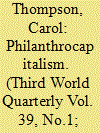

|
|
|
|
|
| Summary/Abstract |
Engaging the lively debates about the next expression of neoliberalism, this study suggests that it is evolving into philanthrocapitalism. After a brief discussion of the trajectories from neoliberalism, the article addresses the core ideology of philanthrocapitalism. The central thesis explores how philanthrocapitalism is moving beyond the requirement of ‘business practices’ for recipients of donor funds, into enforcing ‘business rule’ on to the public domain. Although philanthrocapitalism is most debated in the fields of health care and education, this article uses empirical analysis of international agricultural policies trying to enlist Southern Africa policies. It explores how philanthrocapitalist rule is reducing transparency, participation and deliberation within the public domain, well beyond requesting efficient business practices for greater food security. It concludes with how smallholder farmers are actively organising to resist business rule over their genetic resources and farming practices.
|
|
|
|
|
|
|
|
|
|
|
|
|
|
|
|
| 9 |
ID:
144259
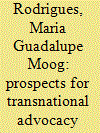

|
|
|
|
|
| Summary/Abstract |
The literature on transnational advocacy networks (TANs) suggests that they may be a valid option for activists in India, Brazil and South Africa (the members of the IBSA bloc) to coordinate efforts to influence their states’ foreign policy. Since its formation the IBSA bloc has formalised spaces for networking among governmental officials, business interests and academics. Yet there are no examples of TANs whose activism has occurred across IBSA, with the purpose of influencing the bloc’s policies. This case study of the challenges that Brazilian advocacy groups face in forging TANs with like-minded groups across IBSA sheds light on the challenges confronting activists and suggests ways of overcoming them.
|
|
|
|
|
|
|
|
|
|
|
|
|
|
|
|
| 10 |
ID:
166688
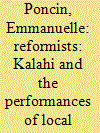

|
|
|
|
|
| Summary/Abstract |
To make sense of the gap between the theory and practice of community-driven development (CDD), development scholars and practitioners have proposed that the success of interventions is relative to the reform-mindedness of local government officials. This article sheds some light on the good governance performances of local government officials as part of the CDD programme Kalahi in the province of Bohol, Philippines. It highlights that locally, mayors who styled themselves as reformists enjoyed heightened power and electoral victories. In parallel, the province experienced a pattern of ‘growth with immiserisation’ and persistent political clientelism wrapped in a discourse of pro-poor development.
|
|
|
|
|
|
|
|
|
|
|
|
|
|
|
|
| 11 |
ID:
139238
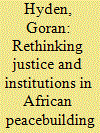

|
|
|
|
|
| Summary/Abstract |
This article argues that conflicts in Africa need to be understood in the context of local conceptions of justice, which differ from those of the liberal peace model. Justice in African society is based on the notion of reciprocity which, when practised, tends to lead to solutions that resemble prisoner dilemma games. Because agreements are more like truces than true peace agreements they are easily abandoned when the costs of adhering are higher. Bringing in these local conceptions are vital for peacebuilding in Africa but so is the need to reform them so that they become more sustainable.
|
|
|
|
|
|
|
|
|
|
|
|
|
|
|
|
| 12 |
ID:
141899
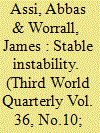

|
|
|
|
|
| Summary/Abstract |
Given the morass of the Syrian civil war and Lebanon’s exposure to the consequences, this article seeks to explore how the intersecting dynamics of Lebanese domestic conflicts and the multiple implications of the bloodbath in Syria have influenced the behaviour of Lebanese political parties in their ongoing struggle over the formulation of a new electoral law, leading to a broad consensus among the country’s parties to postpone the 2013 parliamentary elections. The article argues that, while the usual attempts to profit at the expense of other groups in society are still present and external patrons still wield great influence, the decision to postpone the elections also demonstrates a degree of pragmatism and political development since, despite dire predictions to the contrary, Lebanon has not succumbed to the return of its own civil war. Instead a complex mixture of pragmatism, elision of interests and external influence, combined with local agency, has led Lebanon into a situation of stable instability.
|
|
|
|
|
|
|
|
|
|
|
|
|
|
|
|
| 13 |
ID:
154483
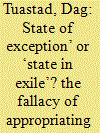

|
|
|
|
|
| Summary/Abstract |
To refer to Palestinian refugee camps as states of exception, appropriating the paradigm of Giorgio Agamben, is definitely tempting. Agamben argues that in times of crisis, individual rights of citizens are diminished and entire categories of people kept outside the political system. Nevertheless, there are flaws in applying Agamben’s perspective on Palestinian camps. It acquits the camp residents from the autonomy over their own political agency. Historically, in Lebanon, camp residents experienced an almost limitless access to free political organisation. But this access has not been converted into the development of representative, legitimate political structures.
|
|
|
|
|
|
|
|
|
|
|
|
|
|
|
|
| 14 |
ID:
139229
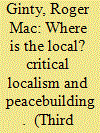

|
|
|
|
|
| Summary/Abstract |
This article is primarily a piece of conceptual scoping and considers the concept of ‘the local’ in relation to peacebuilding. It notes how the local is simultaneously held to blame for conflicts (as unenlightened, dangerous, uncivilised) and is also regarded as a saviour for international peace support operations. Local legitimacy, partnership and ownership of international peace interventions are seen as a fast track to success, sustainability and exit. The article navigates its way around this confused understanding of the local and argues that the local is a (not always helpful) construction. It further argues that, by applying a critical lens towards the concept of the local, we can seek to separate the concept of the local from territory and see it in terms of activity, networks and relationships. This has implications for practice and ‘field’ work.
|
|
|
|
|
|
|
|
|
|
|
|
|
|
|
|
| 15 |
ID:
149437


|
|
|
|
|
| Summary/Abstract |
Gender and development (GAD) has become a transnational discourse and has, as a result, generated its own elite elements. This elitism has tended to be attributed to a Northern hegemony in how feminism has been articulated and then subsequently professionalised and bureaucratised. What has received less attention, and what this paper highlights empirically, is how Southern-based feminisms might themselves be sites of discursive exclusion. The paper interrogates these concerns through an analysis of how professionalisation is evidenced in feminist engagement among civil society organisations working on gender in New Delhi. The analysis suggests that efforts to create spaces for subaltern voices are constrained not only by the disciplining effects of neoliberal frameworks but also – and in tandem – by Southern elite feminist priorities. The implications of these findings are significant: processes of professionalisation and the elitism they engender may have the effect of potentially precluding the engagement of those people on the margins whose voices are so sought after as part of efforts to facilitate inclusive development.
|
|
|
|
|
|
|
|
|
|
|
|
|
|
|
|
|
|
|
|
|